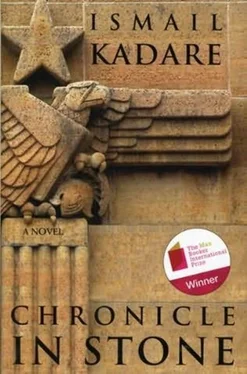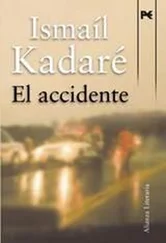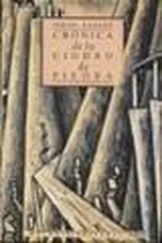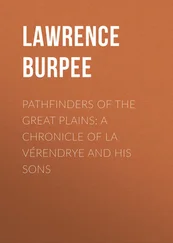Ismaíl Kadaré - Chronicle in Stone
Здесь есть возможность читать онлайн «Ismaíl Kadaré - Chronicle in Stone» весь текст электронной книги совершенно бесплатно (целиком полную версию без сокращений). В некоторых случаях можно слушать аудио, скачать через торрент в формате fb2 и присутствует краткое содержание. Жанр: Современная проза, на английском языке. Описание произведения, (предисловие) а так же отзывы посетителей доступны на портале библиотеки ЛибКат.
- Название:Chronicle in Stone
- Автор:
- Жанр:
- Год:неизвестен
- ISBN:нет данных
- Рейтинг книги:4 / 5. Голосов: 1
-
Избранное:Добавить в избранное
- Отзывы:
-
Ваша оценка:
- 80
- 1
- 2
- 3
- 4
- 5
Chronicle in Stone: краткое содержание, описание и аннотация
Предлагаем к чтению аннотацию, описание, краткое содержание или предисловие (зависит от того, что написал сам автор книги «Chronicle in Stone»). Если вы не нашли необходимую информацию о книге — напишите в комментариях, мы постараемся отыскать её.
Chronicle in Stone — читать онлайн бесплатно полную книгу (весь текст) целиком
Ниже представлен текст книги, разбитый по страницам. Система сохранения места последней прочитанной страницы, позволяет с удобством читать онлайн бесплатно книгу «Chronicle in Stone», без необходимости каждый раз заново искать на чём Вы остановились. Поставьте закладку, и сможете в любой момент перейти на страницу, на которой закончили чтение.
Интервал:
Закладка:
“Yes.”
“Let’s ask Javer.”
Isa and Javer disappeared from time to time. We went and found them.
“‘Medieval’,” Javer said, “refers to the Middle Ages, the bleakest period in history. The story of that Macbeth you read is set in that age.”
Certain people were associating the citadel with the Middle Ages more and more. The fortress was indeed very old. It had given birth to the city, and our houses resembled the citadel the way children look like their mothers. Over the centuries, the city had grown up a lot. Although the fortress was in good condition, no one ever thought that one day it would have the strength to take its offspring, the city, under its protection. That was a terrifying return to the past. It was like someone going back into the womb. Now that it had happened, we all wondered what would be next. Having accepted the citadel’s services, we now had to suffer the consequences. There might be epidemics as there were in the Middle Ages. Age-old crimes might come back. Xivo Gavo’s chronicle was full of murders and epidemics.
One morning – it was our fifth day in the citadel – Ilir and I were wandering aimlessly through the human jumble. We had already been tempted more than once to leave the tunnels and explore other parts of the fortress, but fear had stopped us. The place was said to be full of mysterious crannies, catacombs and labyrinths you could never find your way out of. Near certain dark passageways we had noticed people, from a distance, who seemed to be paying no attention to us but who, on closer inspection, turned out to be guards.
Roaming through the first gallery, we suddenly caught a few sentence fragments in the midst of the general commotion. Two tall, pale, middle-aged men wearing scarves around their necks were talking. Their voices were strangely monotonous. We forgot everything and fell in quietly behind them. We were captivated. The chains of their words shackled our arms and legs.
“Did the edict with the death sentence come on Monday?”
“No, it was already here on Saturday. Monday was the execution. The palace guard took the head away in a sack. They threw the rest of the body into the chasm from the eastern tower. The officer left for the capital that night.”
“Had he been poisoned when they cut off his head?”
“No, he was just drunk. They put the head in the Nook of Shame in Istanbul, according to custom.”
“I’ve seen that nook.”
“They kept the head there for eleven days, and took it out only to replace it with the head of Kara Razi. You know the rules say that there must be only one head in the nook at a time.”
They kept talking. We were following behind. We had left the tunnel and started across the esplanade. It was raining. Everything was wet and deserted. They walked into a narrow passage, went down some stone steps, up some other steps and into an abandoned gallery. We shivered like freezing puppies.
The gallery had a low ceiling and the echo of our steps came from overhead instead of underfoot. Their words began to twist; they swelled and stretched, endlessly elongated. We couldn’t understand a thing. That lasted until we reached the end of the gallery. We finally came to a large pit with a domed ceiling. There they turned and noticed us. They stared at us for a long time with their grey eyes. We couldn’t stop shivering. Then they looked away, and one of them pointed to some rusty irons hanging from the wall.
“This is where they kept Gur Çerçizi. Chained to those shackles right there. Third from the right. They kept him chained up long after he was dead. When they took the body away, it was half-eaten by rats.”
“What about Karafili? They were imprisoned together, weren’t they?”
“Yes, Karafili was chained up over there, the fifth set. He lived until the sultan’s edict came pardoning him. They took him up to a platform with no parapet at the top of the citadel and everyone thought he would be delirious with joy. When he began walking towards the edge of the wall, someone said he seemed blind, but no one paid attention. He walked to the rampart and when he got to the edge everyone expected him to stop and look down at the beautiful view, make some short statement or just thank the sultan for pardoning him. But instead he took another step and dropped off the cliff. It was only then that everyone realised that he really had lost his sight.”
Now we were going up some stairs. The stones were slippery.
“Hurshid Pasha’s head rolled down these very steps. The right eye was crushed when it fell and the officer who brought the head to the capital was punished. They accused him of not having taken proper care of it during the trip and of not sprinkling it with salt as the rules require.”
“If I’m not mistaken, the rule about the salt was instituted by Bugrahan, the chief physician, after suspicion arose about the head of Timurtash. Isn’t that right?”
“No, the suspicions were about the head of Velldrem. It had changed so much after decapitation that there were those who doubted that it was really his. That was when they instituted the rules.”
They went on chatting about heads for a long time. Absolutely spellbound, we followed them. Their necks were carefully wrapped in their shawls. For a minute it seemed to me that those black shawls were only meant to hold on their heads (long since cut off), to prevent them from rolling to the ground.
I began to feel sick. They were going upstairs now. The air was cooler. We came out into the open.
“Peanuts! Peanuts!”
At last we were safe. We ran like madmen through the packed gallery, looking for our families.
“Where were you? Why are you so pale?” our mothers asked almost simultaneously. “Why are you shaking like that?”
“We’re cold.”
Mamma wrapped us in a big wool blanket. Ilir’s mother gave us each some bread and marmalade. It was nice and warm there, among the living. Some women had come to visit. My father and Bido Sherifi were talking, looking serious. Nazo’s daughter-in-law, chin resting in her hand, stared sadly. Kako Pino was fidgeting with the little yellow bag where she kept her equipment. There would always be weddings, always and everywhere, now and till the end of time, she had replied, when on the first day of the move to the citadel someone had asked why she was taking her bag along. Nazo’s daughter-in-law sighed. Yes, life was nice among living people.
Ilir and I didn’t budge from that spot for the rest of the afternoon and the next day. We sat listening to what the women who came to see our mothers had to say. We were scared to death of running into the two strangers with the black scarves around their necks. We had decided that if we ever encountered them in the crowd, we would plug up our ears as fast as we could so we wouldn’t hear anything they said. Otherwise, if we let their words get into our ears, we would be shackled by them once more and would not be able to resist falling in step behind the men.
That night there was heavy bombing. I kept thinking of Grandmother. Her now solitary footsteps must be echoing through the big house. Up and down the steps. Sighs of wood and old age, and the curse of death she hurled at nations, governments and their planes.
Ilir and I sat in a corner drifting off to sleep when suddenly – like a snake that slithers under your feet before you even see it – the word “arrest” rang out. Necks craned, eyes narrowed, boots marched towards us. Trak-truk, trak-truk. “Under arrest.” Trak-truk. An Italian carabiniere pulled some handcuffs from his pocket. A tall man watched the handcuffs being put on him.
“Look, they’re locking those things on him with a key,” Ilir said to me.
“I saw.”
A woman, apparently the arrested man’s wife, let out a short, sharp scream.
Читать дальшеИнтервал:
Закладка:
Похожие книги на «Chronicle in Stone»
Представляем Вашему вниманию похожие книги на «Chronicle in Stone» списком для выбора. Мы отобрали схожую по названию и смыслу литературу в надежде предоставить читателям больше вариантов отыскать новые, интересные, ещё непрочитанные произведения.
Обсуждение, отзывы о книге «Chronicle in Stone» и просто собственные мнения читателей. Оставьте ваши комментарии, напишите, что Вы думаете о произведении, его смысле или главных героях. Укажите что конкретно понравилось, а что нет, и почему Вы так считаете.












